- Home
- Harlan Coben
Back Spin mb-4 Page 13
Back Spin mb-4 Read online
Page 13
This, Myron knew, was Jack Coldren stripped to his purest state. He was a golfer. A man who wanted to win.
Needed to. Myron understood. He had been there his zone consisting of a large orange ball and a metallic cylinder and a part of him would always be embeshed in that world. It was a fine place to be in many ways, the best place to be. Win was wrong. Winning was not a worthless goal. It was noble. Jack had taken life's hits. He had striven and battled. He had been battered and bloodied.
Yet here he stood, head high, on the road to redemption.
How many people are awarded this opportunity?
How many people truly get the chance to feel this vibrant, to reside for even a short time on such a plateau, to have their hearts and dreams stirred with such unquenchable inner passion?
Jack Coldren stroked the putt. Myron found himself watching the ball slowly arc toward the hole, lost in that vicarious rush that so fiercely drew spectators to sports.
He held his breath and felt something like a tear well up in his eye when the ball dropped in. A birdie. Diane Hoffman made a iist and pumped it. The lead was back up to nine strokes.
Jack looked up at the applauding galley. He acknowledged them with a tip of his hat, but he saw nothing. Still in the zone. Fighting to stay there. For a moment, his eyes locked on Myron's. Myron nodded back, not wanting to nudge him back to reality. Stay in that zone, Myron thought. In that zone, a man can win a tournament. In that zone, a son does not purposely sabotage a father's lifelong dream.
Myron walked past the many portable toilets they'd been provided by a company with the semiaccurate name Royal Flush and headed toward Corporate Row. Golf matches had an unprecedented hierarchy for ticket holders.
True, at most sporting arenas there was a grading of one sort or another some had better seats, obviously, while some had access to skyboxes or even courtside seats. But in those cases, you handed a ticket to an usher or ticket collector and took your place. In golf, you displayed your entrance pass all day. The general-admission folk (read: serfs) usually had a sticker plastered on their shirt, not unlike, say, a scarlet letter. Others wore a plastic card that dangled from a metal chain wrapped around their neck. Sponsors (read: feudal lords) wore either red, silver, or gold cards, depending on how much money they spent. There were also different passes for players' family and friends, Merion club members, Merion club officers, even steady sports agents. And the different cards gave you different access to different places. For example, you had to have a colored card to enter Corporate Row. Or you needed a gold card if you wanted to enter one of those exclusive tents the ones strategically perched on hills like generals' quarters in an old war movie.
Corporate Row was merely a row of tents, each sponsored by one enormous company or another. The theoretical intention of spending at least one hundred grand for a four-day tent rental was to impress corporate clients and gain exposure. The truth, however, was that the tents were a way for the corporate bigwigs to go to the toumament for free. Yes, a few important clients were invited, but Myron also noticed that the company's major officers always managed to show too. And the hundred grand rental fee was just a start. lt didn't include the food, the drinks, the employees not to mention the first-class flights, the deluxe hotel suites, the stretch limos, et cetera, for the bigwigs and their guests.
Boys and girls, can you say, "Chu-ching goes the cash register"? I thought you could.
Myron gave his name to the pretty young woman at the Lock-Horne tent. Win was not there yet, but Esperanza was sitting at a table in the corner.
"You look like shit," Esperanza said.
"Maybe. But at least I feel awful."
"So what happened?"
"Three crackheads adorned with Nazi memorabilia and crowbars jumped me."
She arched an eyebrow. "Only three?"
The woman was constant chuckles. He told her about his run-in and narrow escape. When he was finished, Esperanza shook her head and said, "Hopeless. Absolutely hopeless."
"Don't get all dewy-eyed on me. I'll be fine."
"I found Lloyd Rermart's wife. She's an artist of some kind, lives on the Jersey shore."
."Any word on Lloyd Rermart's body'?" +
Esperanza shook her head. "I checked the NVI and Treemaker Web sites. No death certificate has been issued."
Myron looked at her. "You're kidding."
"Nope. But it might not be on the Web yet. The other ffices are closed until Monday. And even if one hasn't been issued, it might not mean anything."
"Why not?" he asked.
"A body is supposed to be missing for a certain amount of time before the person can be declared dead,"
Esperanza explained. "I don't know five years or something. But what often happens is that the next of kin files a motion in order to settle insurance claims and the estate.
But Lloyd Rennart committed suicide."
"So there'd be no insurance," Myron said.
"Right. And assuming everything was held jointly between Rennart and his wife, then there would be no need for her to press it."
Myron nodded. It made sense. Still it was yet another nagging hangnail that needed to be clipped. "You want something to drink?" he asked.
She shook her head. `
"I'll be right back." Myron grabbed a Yoo-Hoo. Win had made sure the Lock-Home tent stocked them. What a pal. A television monitor in the upper. corner had a scoreboard. Jack had just iinished the fifteenth hole. Both he and Crispin had parred it. Barring a sudden collapse, Jack was going to take a huge lead into tomorrow's' final round.
When Myron got settled again, Esperanza said, "I
want to talk to you about something."
"Shoot." +
"It's about my graduating law school."
"Okay," Myron said, dragging out the word.
"You've been avoiding the subject," she said.
"What are you talking about? I'm the one who wants to go to your graduation, remember?"
"That's not what I mean." Her fingers found and began to fiddle with a straw wrapper. "I'm talking about what happens after I graduate. I'm going to be a fullfledged attorney soon. My role in the company should change."
Myron nodded. "Agreed."
"For one thing, I'd like an office."
"We don't have the space."
"The conference room is too large," she countered.
"You can slice a little out of there and a little out of the waiting room. It won't be a huge office, but it'll be good enough}'
Myron nodded slowly. "We can look into that."
"It's important to me, Myron."
"Okay, it sounds possible."
"Second, I don't want a raise."
"Don't?"
"That's right." +
"Odd negotiating technique, Esperanza, but you convinced me. Much as I might like to give you a raise, you will not receive one penny more. I surrender."
"You're doing it again."
"Doing what?"
"Joking around when I'm serious. You don't like change, Myron. I know that. It's why you lived with your parents until a few months ago. It's why you still keep Jessica around when you should have forgotten about her years ago."
"Do me a favor," he said wearily. "Spare me the amateur analysis, okay?"
"Just stating the facts. You don't like change."
"Who does? And I love Jessica. You know that."
"Fine, you `love her," Esperanza said dismissively.
"You're right, I shouldn't have brought it up."
"Good. Are we done?"
"No." Esperanza stopped playing with the straw wrapper. She crossed her legs and folded her hands in her lap. "'l`his isn't easy for me to talk about," she said.
"Do you want to do it another time?"
She rolled her eyes. "No, I don't want to do it another time. I want you to listen to me. Really listen."
Myron stayed silent, leaned forward a little.
"The reason I don't want a raise is because I don't want to
work for someone. My father worked his whole life doing menial jobs for a variety of assholes. My mother spent hers cleaning other people's houses." Esperanza stopped, swallowed, took a breath. "I don't want to do that. I don't want to spend my life working for anyone."
"Including me?"
"I said anyone, didn't I?" She shook her head.
"Jesus, you just don't listen sometimes."
Myron opened his mouth, closed it. "Then I don't see where you're going with this."
"I want to be a part owner," she said.
He made a face. "Of MB SportsReps?"
"No, of AT&T. Of course MB."
"But the name is MB," Myron said "The M is for Myron. B for Bolitar. Your name is Esperanza Diaz. I
can't make it MBED. What kind of name is that?"
She just looked at him. "You're doing it again; I'm trying to have a serious conversation."
' 'Now? You pick now when I just got hit over the head '
with a tire iron "
' ' Shoulder. ' '
"Whatever. Look, you know how much you mean to me "
"This isn't about our friendship," she interrupted. "I
don't care what I mean to you right now. I care about what I mean to MB SportsReps."
"You mean a lot to MB. A hell of a lot." He stopped.
"But'?"
"But nothing. You just caught me a little off balance, that's all. I was just jumped by a group of neo-Nazis. That does funny things to the psyche of people of my persuasion.
I'm also trying to solve a possible kidnapping. I
know things have to change. I planned on giving you more to do, letting you handle more negotiations, hiring someone new. But a partnership . . . that's a different kettle of gefilte."
Her voice was unyielding. "Meaning?"
"Meaning I'd like to think about it, okay? How do you plan on becoming a partner? What percentage do you I
want'? Do you want to buy in or work your way in or what'? These are things we'll have to go over, and I don't think now is the time."
'Fine." She stood up. "I'm going to hang around the players' lounge. See if I can strike up a conversation with one of the wives."
"Good idea."
"I'll see you later." She tumed to leave.
"Esperanza?"
She looked at him.
"You're not mad, right'?"
"Not mad," she repeated.
"We'll work something out," he said.
She nodded. "Right."
"Don't forget. We're meeting with Tad Crispin an hour after they finish. By the pro shop."
"You want me there?"
"Yes."
She shrugged. "Okay." Then she left.
Myron leaned back and watched her go. Great. Just what he needed. His best friend in the world as a business partner. It never worked. Money screwed up relationships;
it was simply one of life's givens. His father and his uncle two closer brothers you never saw had tried it. The outcome had been disastrous. Dad finally bought Uncle Morris out, but the two men didn't speak to each other for four years. Myron and Win had labored painstakingly to keep their businesses separate while maintaining the same interests and goals. It worked because there was no crossinterference or money to divide up. With Esperanza things had been great, but that was because the relationship had always been boss and employee. Their roles were well defined. But at the same time, he understood. Esperanza deserved this chance. She had earned it. She was more than an important employee to MB. She was a part of it.
So what to do?
He sat back and chugged the Yoo-Hoo, waiting for an idea. Fortunately, his thoughts were waylaid when someone tapped his shoulder.
Chapter l7
"Hello."
Myron turned around. It was Linda Coldren. Her head was wrapped in a semi-babushka and she wore dark sunglasses.
Greta Garbo circa 1984. She opened her purse.
"I forwarded the home phone here," she whispered, pointing to a cellular phone in the purse. "Mind if I sit down?"
"Please do," Myron said.
She sat facing him. The sunglasses were big, but Myron could still see a hint of redness around the rims of her eyes. Her nose, too, looked like it had been rubbed raw by a Kleenex overdose. "Anything new?" she asked.
He told her about the Crusty Nazis jumping him.
Linda asked several follow-up questions. Again the internal paradox tore at her: she wanted her son to be safe, yet she did not want it all to be a hoax. Myron finished by saying, "I still think we should get in touch with the feds.
I can do it quietly."
She shook her head. "Too risky."
"So is going on like this."
Linda Coldren shook her head again and leaned back.
For several moments they sat in silence. Her gaze was cast somewhere over his shoulder. Then she said, "When Chad was bom, I took off nearly two years. Did you know that'?"
"No," Myron said.
"Women's golf" she muttered. "I was at the height of my game, the top female golfer in the world, and yet you never read about it."
"I don't follow golf much," Myron said.
"Yeah, right," she snorted. "If Jack Nicklaus took two years off you would have heard about it."
Myron nodded. She had a point. "Was it tough coming back?" he asked.
"You mean in terms of playing or leaving my son?"
"Both."
She took a breath and considered the question. "I
missed playing," she said. "You have no idea how much.
I regained the number one spot in a couple of months. As for Chad, well, he was still an infant. I hired a nanny to travel with us."
"How long did that last?" "
"Until Chad was three. That's when I realized that I
couldn't drag him around anymore. It wasn't fair to him.
A child needs same sort of stability. So I had to make choice."
They fell into silence.
"Don't get me wrong," she said. "I'm not into the self-pity thing and I'm glad women are given choices. But what they don't tell you is that when you have choices, you have guilt."
"What kind of guilt?"
"A mother's guilt, the worst kind there is. The pangs are constant and ceaseless. They haunt your sleep. They point accusatory fingers. Every joyous swing of the golf club made me feel like I was forsaking my own child.
I flew home as often as I could. I missed some tournaments that I really wanted to play in. I tried damn hard to balance career and motherhood. And every step of the way, I felt like a selfish louse." She looked at him. "Do you understand that?"
"Yes, I think so."
"But you don't really sympathize," she added.
"Of course I do."
Linda Coldren gave him a skeptical glance. "If I had been a stay-at-home mother, would you have been so quick to suspect that Chad was behind this? Didn't the fact that I was an absent mother sway your thinking?"
"Not an absent mother," Myron corrected. "Absent parents."
"Same thjng."
"No. You were making more money. You were by far the more successful parent business-wise. If anyone should have stayed home, it was Jack." `
She smiled. "Aren't we politically correct'?"
"Nope. Just practical."
"But it's not that simple, Myron. Jack loves his son.
And during the years he didn't qualify for the tour, he did stay home with him. But let's face facts: Like it or not, it's the mother who bears that burden."
"Doesn't make it right."
"Nor does it let me off the hook. Like I said, I made my choices. If I had to do it all over again, I still would have toured."
"And you still would have felt guilty."
She nodded. "With choice comes guilt. No escaping it." '
Myron took a sip of his Yoo-Hoo. "You said that Jack stayed home some of the time."
"Yes," she said. "When he failed Q school."
"Q school?"
"Qualifyi
ng school," she said. "Every year the top 125 moneymakers get their PGA Tour card automatically.
A couple of other players get sponsor exemptions. The rest are forced to go to Q school. Qualifying school. If you don't do well there, you don't play for the year."
"One toumament decides all that'?"
She tilted the glass at him as though making a toast.
"That's right."
Talk about pressure. "So when Jack failed Q school, he'd stay home for the year?"
She nodded "How did Jack and Chad get along?" .
"Chad used to worship his father," Linda said.
"And now?"
She looked off, her face vaguely pained. "Now Chad is old enough to wonder why his father keeps losing. I
don't know what he thinks anymore. But Jack is a good man. He tries very hard. You have to understand what happened to him. Losing the Open that way it might sound overly melodramatic, but it killed something inside him. Not even having a son could make him whole."
"It shouldn't matter so much," Myron said, hearing the echo of Win in his words. "It was just one tournament."
"You were involved in a lot of big games," she said.
; "Ever choke away a victory like Jack did?"
"No."
"Neither have I."
Two gray-haired men sporting matching green ascots made their way down the buifet table. They leaned over each food selection and frowned like it had ants. Their plates were still piled high enough to cause the occasional avalanche.
"There's something else," Linda said.
Myron waited.
She adjusted the sunglasses and put her hands on the table palms down. "Jack and I are not close. We've haven't been close in many years."
When she didn't continue, Myron said, "But you've stayed married."
"Yes."
He wanted to ask why, but the question was so obvious, just hanging out there within easy view, that to voice it would be redundant.
"I am a constant reminder of his failures," she continued.
"It's not easy for a man to live with that. We're supposed to be life partners, but I have what Jack longs for most." Linda tilted her head. "It's funny."
"What?"
"l never allow mediocrity on the golf course. Yet I
allowed it to dominate my personal life. Don't you find that odd?"

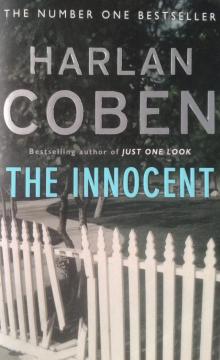 The Innocent
The Innocent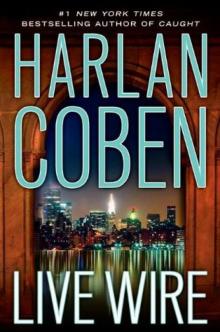 Live Wire
Live Wire Play Dead
Play Dead Drop Shot
Drop Shot Seconds Away
Seconds Away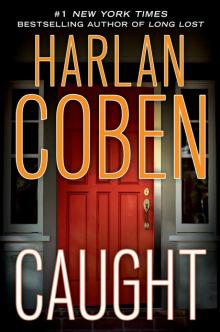 Caught
Caught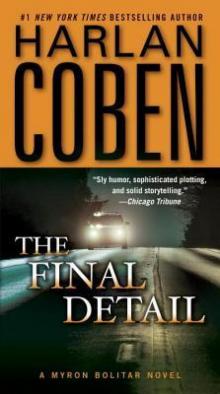 The Final Detail
The Final Detail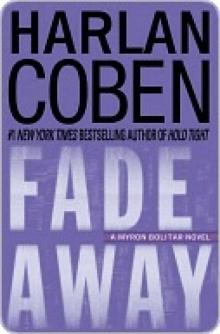 Fade Away
Fade Away Home
Home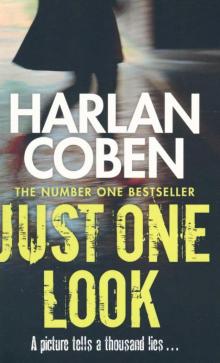 Just One Look
Just One Look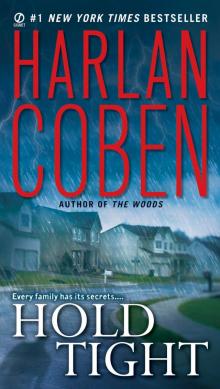 Hold Tight
Hold Tight Fool Me Once
Fool Me Once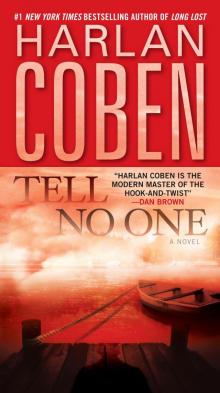 Tell No One
Tell No One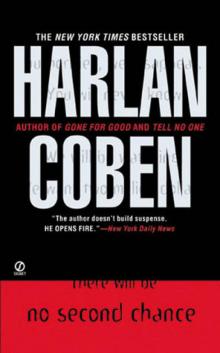 No Second Chance
No Second Chance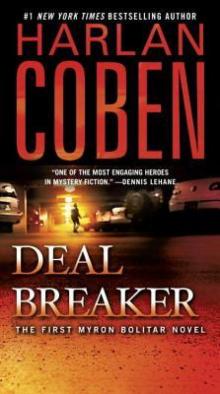 Deal Breaker
Deal Breaker Long Lost
Long Lost One False Move
One False Move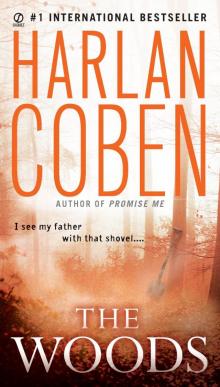 The Woods
The Woods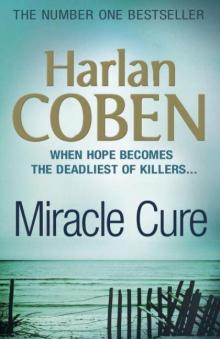 Miracle Cure
Miracle Cure Found
Found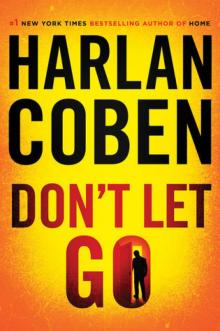 Don't Let Go
Don't Let Go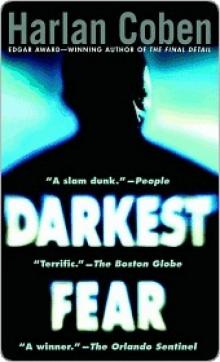 Darkest Fear
Darkest Fear The Stranger
The Stranger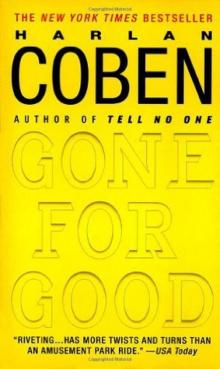 Gone for Good
Gone for Good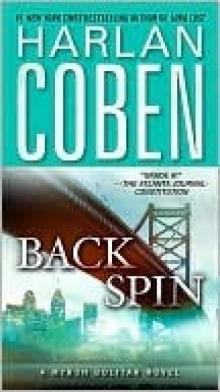 Back Spin
Back Spin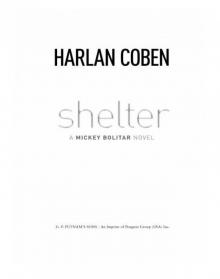 Shelter
Shelter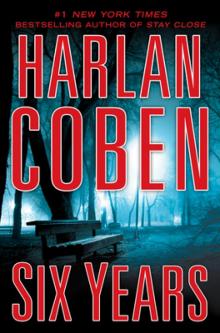 Six Years
Six Years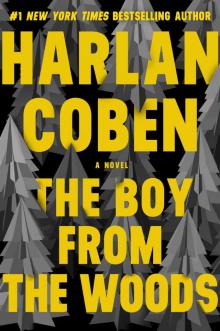 The Boy from the Woods
The Boy from the Woods Missing You
Missing You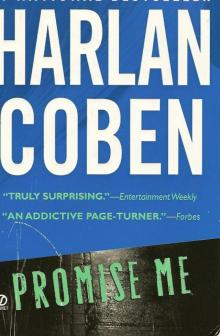 Promise Me mb-8
Promise Me mb-8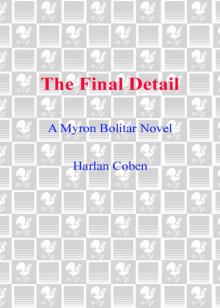 The Final Detail: A Myron Bolitar Novel
The Final Detail: A Myron Bolitar Novel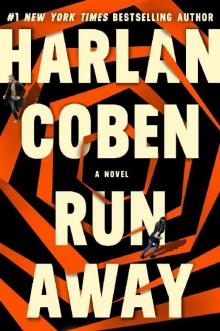 Run Away
Run Away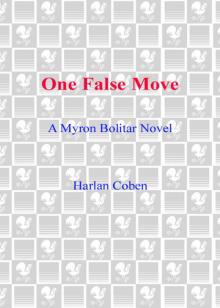 One False Move: A Myron Bolitar Novel
One False Move: A Myron Bolitar Novel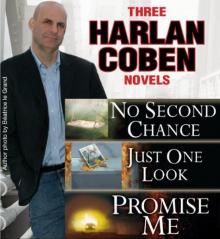 Three Harlan Coben Novels
Three Harlan Coben Novels the Woods (2007)
the Woods (2007) Tell No One (2001)
Tell No One (2001) the Innocent (2005)
the Innocent (2005)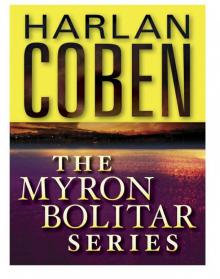 The Myron Bolitar Series 7-Book Bundle
The Myron Bolitar Series 7-Book Bundle Gone for Good (2002)
Gone for Good (2002) Caught (2010)
Caught (2010) Hold Tight (2008)
Hold Tight (2008)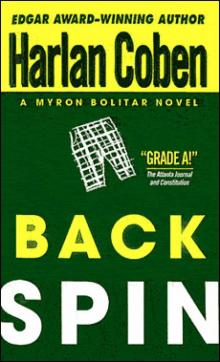 04 - Back Spin
04 - Back Spin Miracle Cure (1991)
Miracle Cure (1991) Harlan Coben 3 Novel Collection
Harlan Coben 3 Novel Collection Just One Look (2004)
Just One Look (2004)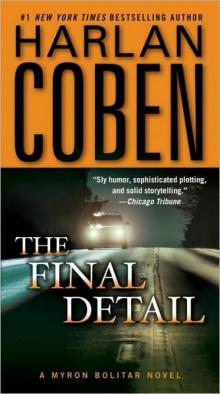 The Final Detail mb-6
The Final Detail mb-6 Play Dead (2010)
Play Dead (2010)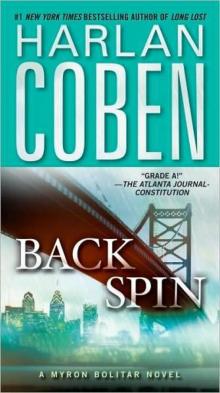 Back Spin mb-4
Back Spin mb-4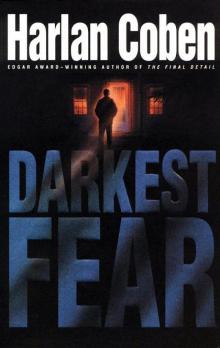 Darkest Fear mb-7
Darkest Fear mb-7